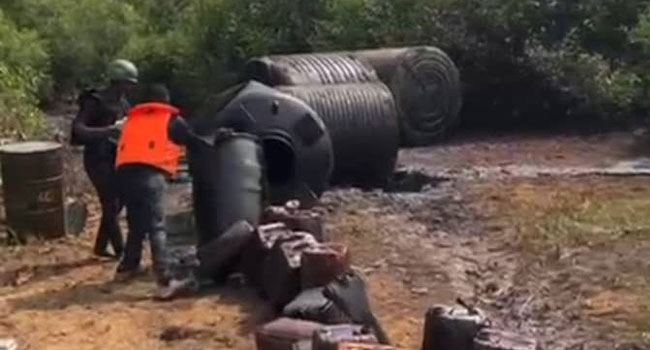In a bold operation aimed at curbing crude oil theft and environmental degradation, the Nigerian Navy has dismantled nine illegal refining sites and destroyed over 35,000 litres of crude and diesel in Ondo State. The operation, carried out by the Forward Operating Base (FOB) in Igbokoda, marks yet another milestone in the military’s intensified crackdown on illicit oil operations.
The operation took place on January 6, 2025, in Obenla, a community nestled within the Ilaje Local Government Area of the state. Commander of the Base, Navy Captain Aliyu Usman, disclosed details of the raid to journalists during a briefing on Thursday, emphasizing the Navy’s unwavering resolve to end oil theft in Nigeria.
“Armed with credible intelligence, the FOB Igbokoda stormed an illegal refining camp within Obenla,” Usman explained. “Our team uncovered nine illegal refining sites and recovered 20,000 litres of crude oil yet to be processed, alongside 15,000 litres of illegally refined diesel, also known as automatic gas oil (AGO).”
Illegal Operators Flee in Panic
The Commander revealed that the suspects fled the scene before the arrival of the naval team. “The perpetrators, likely tipped off, abandoned the sites and fled to avoid arrest. Nevertheless, we’ve crippled their operations, and the seized products have been destroyed,” he stated.
The Navy described the dismantled sites as an intricate network of makeshift camps used for illegal refining. Massive tanks, pipelines, and firewood were discovered at the scene—an indication of the scale and organization behind the criminal enterprise.
A Clear Message to Criminals
Addressing journalists, Captain Usman underscored the Navy’s commitment to stamping out illegal oil activities in the country. “These efforts will continue relentlessly until all illegalities are stopped. The Nigerian Navy remains steadfast in its mission to secure our maritime environment and rid it of acts that harm our economy and ecosystem,” he declared.
Usman also seized the opportunity to warn individuals involved in such criminal endeavors to find legitimate means of livelihood. “The risks are high for perpetrators. Instead of jeopardizing our environment and stealing national resources, they should consider contributing positively to society through lawful enterprises.”
Environmental Impacts of Oil Theft
Oil theft and illegal refining are notorious for leaving devastating environmental footprints. The Obenla operation is seen as not only a security victory but also an environmental one. The crude oil refining process conducted in unregulated facilities releases toxic waste into rivers, pollutes air quality, and disrupts marine life—a blow to communities that depend on fishing and farming.
Experts estimate that Nigeria loses billions of dollars annually due to oil theft and associated environmental degradation. The Nigerian government and international observers have continually expressed concerns over the long-term consequences, including severe erosion of public health and livelihoods in oil-producing regions.
Community Engagement
Beyond dismantling the sites, the Navy is employing softer measures to discourage oil theft. During the operation, Obenla residents were sensitized to the dangers of harboring illegal refining activities. Usman highlighted the potential hazards, including explosions and the risk of prosecution.
He added, “Community involvement is critical. These operations succeed when locals understand the broader implications of such activities and cooperate in ensuring their environment is safe and protected.”
Navy’s Renewed Efforts
This recent operation in Ondo State is part of a broader mandate by the Nigerian Navy to combat oil theft nationwide. The FOB Igbokoda has intensified its activities in recent months, targeting hotspots in riverine communities where illegal operations often thrive under the radar.
In the Niger Delta region, where crude theft remains rampant, naval patrols have successfully intercepted numerous vessels laden with stolen oil. The Navy collaborates closely with other agencies, including the Nigerian National Petroleum Corporation Limited (NNPC), to implement strategies aimed at tackling this menace comprehensively.
Government Commitment
The federal government has continually expressed its commitment to ending oil theft, a recurring issue that undermines Nigeria’s oil-dependent economy. Stakeholders have called for advanced technology, tighter surveillance, and stronger punitive measures to complement military interventions like the one in Ondo State.
In his remarks, President Bola Tinubu recently praised security agencies for their efforts in combating oil theft. However, he noted that more must be done to close loopholes in the oil sector and address socio-economic factors that drive individuals into such illegal ventures.
Road Ahead
While the Navy’s intervention in Ondo State is commendable, the fight against crude oil theft is far from over. Stakeholders in security, the oil industry, and environmental advocacy have emphasized the need for coordinated efforts to sustain these victories.
“The issue of oil theft goes beyond cracking down on illegal refineries,” said environmentalist Prof. Femi Daramola. “It requires addressing systemic problems, providing alternative livelihoods for affected communities, and implementing robust monitoring mechanisms across Nigeria’s oil-producing regions.

